

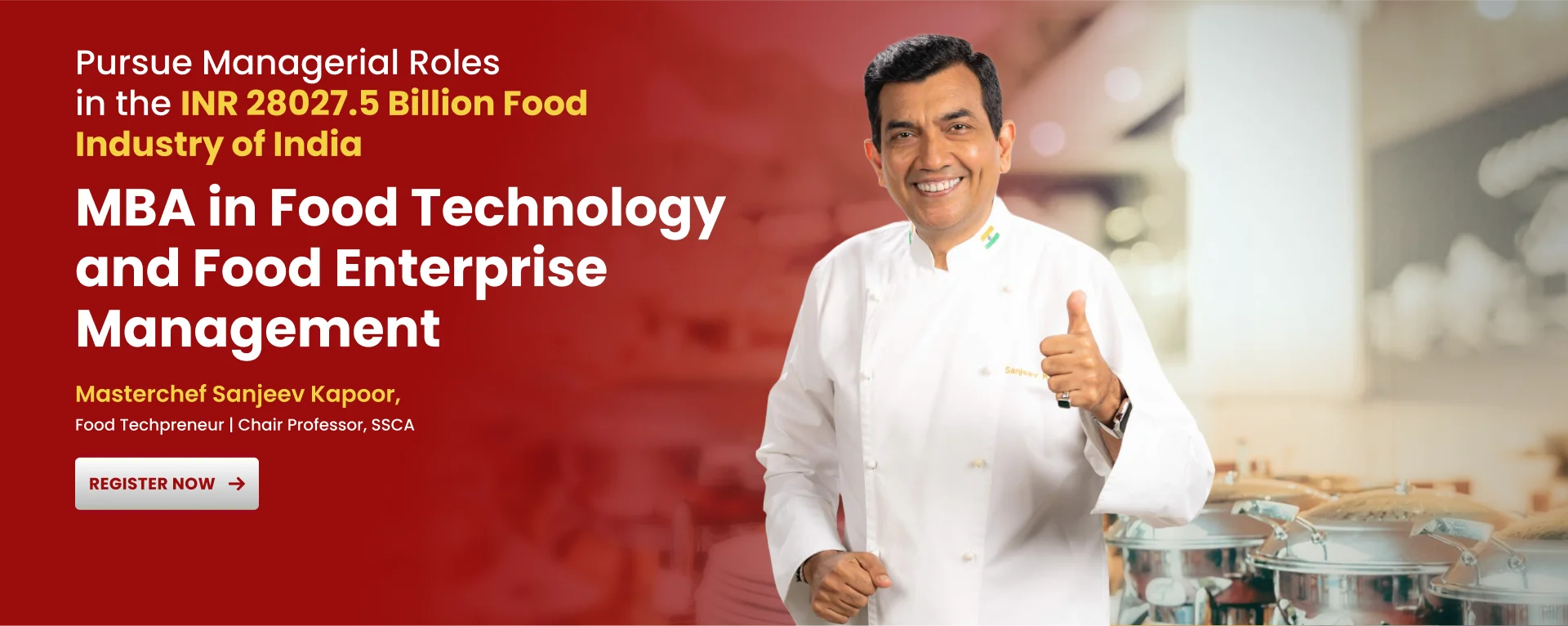
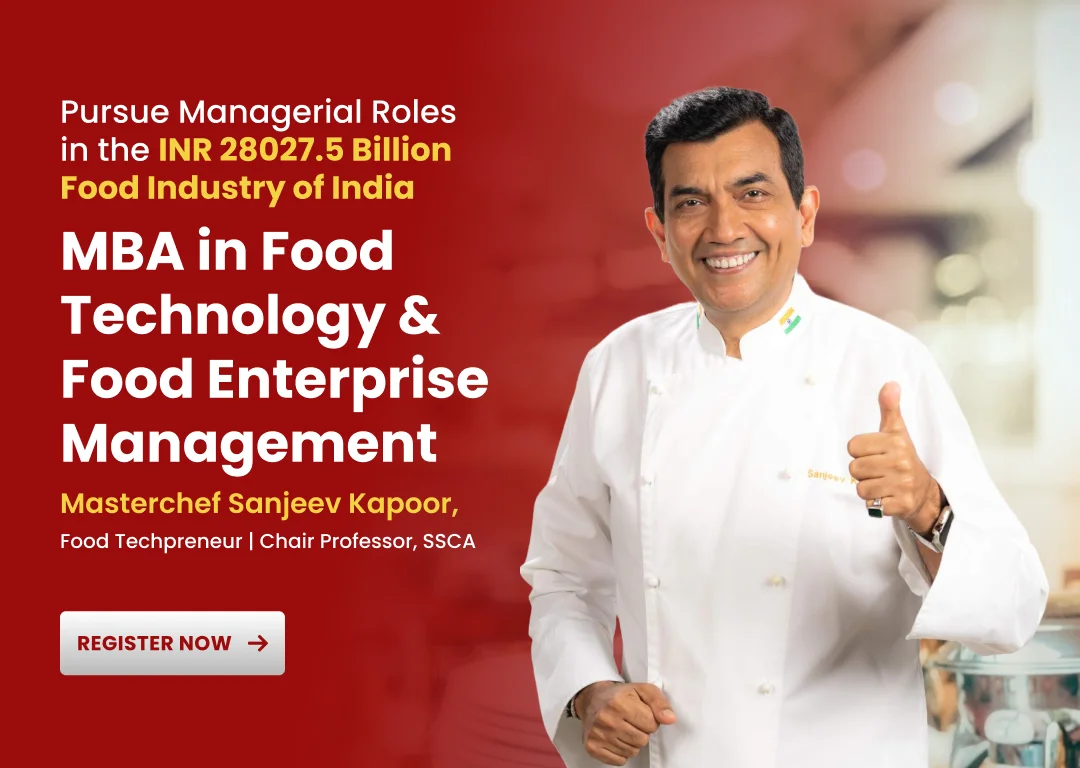
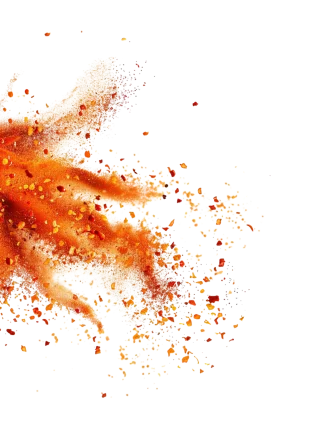
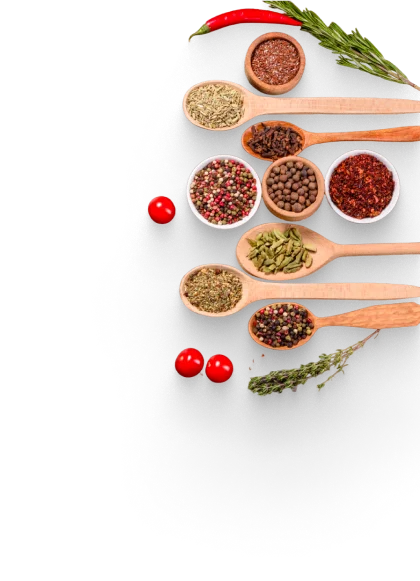

Is this the right time to pursue
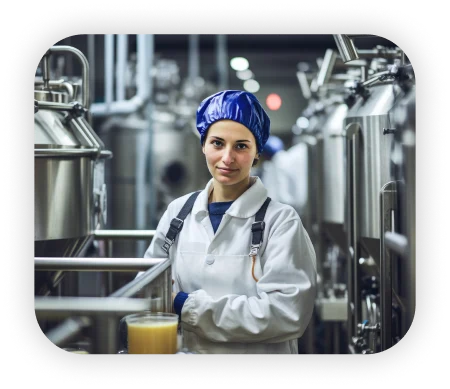
Indian food processing industry employees 1.93 million people
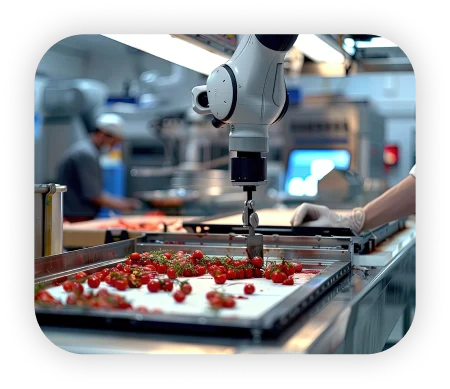
India ranked 7th in the world in processed food exports
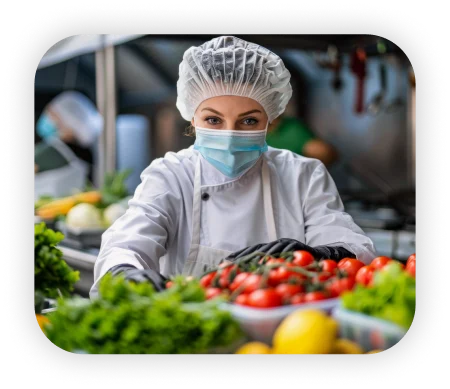
Indian Food Processing market to reach $535 bn by 2025

65% of recruiters in food industry prefer candidates with advanced qualifications
Hear from Masterchef Sanjeev Kapoor himself…
Play Video



Gain expertise in food processing, preservation, and specialized sectors of HORECA, FMCG, and Food Processing Industries.

Food business management principles of a variety of commercial & non-commercial food service operations & food processing.

Entrepreneurial opportunities in the present and future ecosystems are prevalent in the food tech industry.

Learn strategic management practices in various commercial and non-commercial food service operations and the food processing industry.

International standards of Food Hygiene, Safety and Handling Practices.

Purchasing, storing, and handling fresh and raw food products.

Learn industry-specific skills in food safety, hygiene, purchasing and logistical practices.

Gain expertise in food processing, preservation, and specialized sectors of HORECA, FMCG, and Food Processing Industries.

Food business management principles of a variety of commercial & non-commercial food service operations & food processing.

Entrepreneurial opportunities in the present and future ecosystems are prevalent in the food tech industry.

Learn strategic management practices in various commercial and non-commercial food service operations and the food processing industry.

International standards of Food Hygiene, Safety and Handling Practices.

Purchasing, storing, and handling fresh and raw food products.

Learn industry-specific skills in food safety, hygiene, purchasing and logistical practices.
under the 2-year full-time
MBA in Food Technology & Food Enterprise Management

Culinary Arts
Principles of cooking, food and beverages processing, service operations management, science of developing new recipes, indigenous regional indian cooking and traditional preservation techniques.

Food Enterprise Management
Food product development and consumer studies, start ups and intellectual property rights, food laws and legal metrology, entrepreneurship development in food processing.

Culinary Science and Food Technology
Food science, sensory food science, food preservation sciences, food fermentation science, food safety and quality management, nutraceuticals and functional foods, food packaging.

Food Business Management
Financial accounting and management, hr management, marketing management, strategic management, strategic, data and business analytics and research.
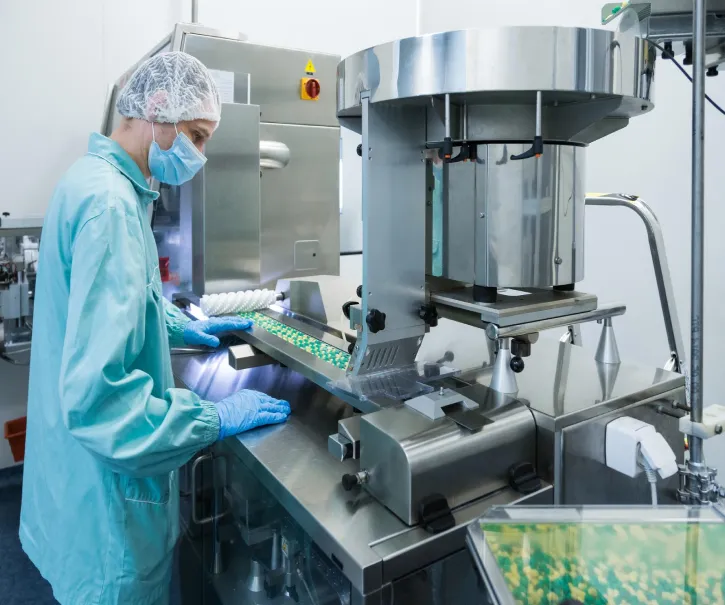
(Food Technology & Food Enterprise Management)
Symbiosis School of Culinary Arts (SSCA) is a constituent of Symbiosis International University, founded in 2016. SSCA caters to the needs of the Food Industry to train and develop specialized Culinary, Hospitality and Food Processing professionals.
The food processing and technology industry is witnessing stupendous growth post-pandemic as packaged foods with a higher shelf life have increased demand. This results in a high demand for trained professionals with business backgrounds to be part of this growth story.
To cater to this niche requirement, SSCA has commenced MBA (Food Technology and Food Enterprise Management) from AY 2024-25, which is an innovative 2-year, full-time Master’s degree program specially designed to deliver world-class Food Tech and Food Business Management education to groom professionals to lead the food sector for FMCG and HORECA segments.


Some of the top recruiters are among the top food manufacturing companies as follows












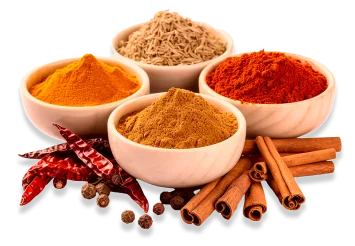
Eligibility Criteria (as per applicable Statutory Council Norms): Graduates from any recognised University/ Institution in Food Technology, Hotel Management, Home Science, Food Science & Quality Control, Culinary Arts, Food Ecology/Sustainability, Packaging Technology, Nutrition, Microbiology, Agriculture, Biotechnology, Food Engineering etc; with a minimum of 50% marks or equivalent grade (45% marks or equivalent grade for Scheduled Caste /Scheduled Tribes) Additional Eligibility Criteria: Required Completion Certification of FoSTaC FSS Level 2 (Advanced) Manufacturing & Catering, FSMS Internal Auditor, HACCP, GHP etc.
| Details | Date |
|---|---|
| Non-SNAP Programme Registration Begins | Monday, 22nd January 2024 |
| Last Date to apply for Non-SNAP admission | Saturday, 15th June 2024 |
| Last Date to pay for Non-SNAP admission | Saturday, 15th June 2024 |
| Admit Card Generation | At Institute level 3 days before GE-PI |
| GE-PI Dates | Friday, 23rd Feb 2024
Friday 22nd March 2024 Friday, 5th April 2024 Friday, 19th April 2024 Friday, 10h May 2024 Friday, 31st May 2024 |
| Result Declaration | Within 10 days from Entrance Test and GE-PI |
| Announcement of First non-SNAP Merit list | February 29, 2024 (Thursday) |
| Last date for payment of fees for candidates in the first non-SNAP merit list | March 14, 2024 (Thursday) |
| Programme Commencement | Monday, 10th June 2024 |
*SIU reserves the right to change these dates in view of uncertainties prevailing across.
Please note that the entire process will be conducted in an online virtual mode.
All registered candidates have to ensure appropriate availability of the bandwidth for the conduct of the selection process.*Students not paying the fees and confirming admission by the due date will be moved to the waiting list.
PS: Students who wish to apply for MBA (Food Technology and Food Enterprise Management) programme, have to pay Rs 1500/- for programme registration.
In today's high-demand market, there is a notable need for food scientists and culinary specialists with expertise in food technology and a deep understanding of market dynamics. The symbiosis school of culinary arts mba programme perfectly meets this demand. Through a multidisciplinary approach, the institution imparts knowledge in three critical areas: management, food technology, and culinary arts, ensuring graduates are well-prepared for the industry. The program's unique blend equips students with business acumen and practical skills, positioning them for career success.
Symbiosis school of culinary arts, a part of symbiosis international university since 2016, is the country's first school dedicated to offering specialized culinary science and arts qualifications. Established to address the needs of the food industry, the school's flagship bachelor's degree in culinary arts has become highly sought after.


SSCA features state-of-the-art culinary labs designed like professional kitchens, equipped with modern tools across a 12,000 sq ft area for practical student learning.
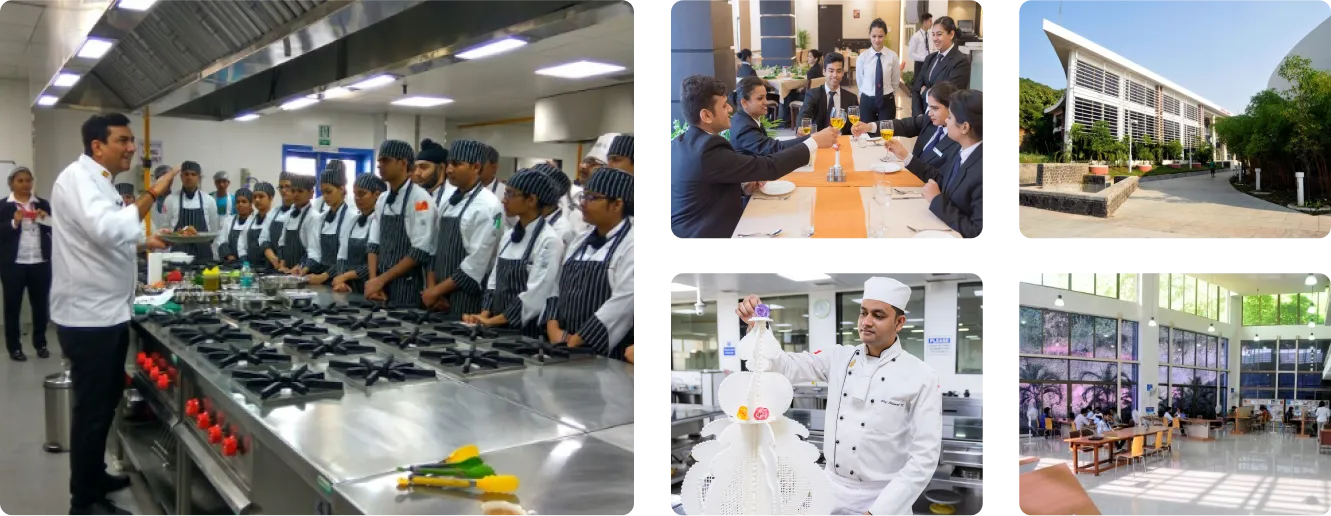
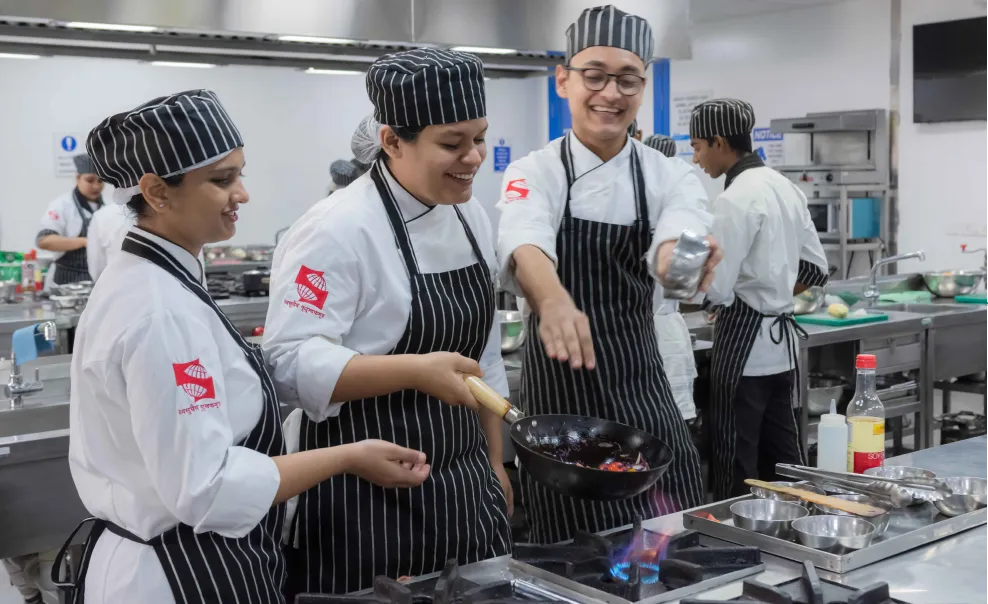

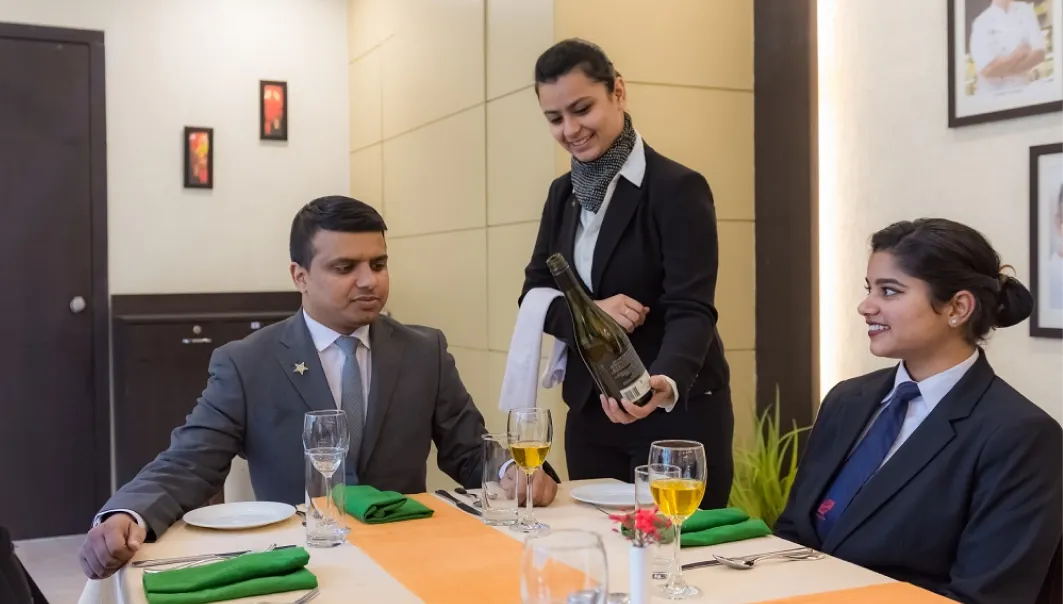


MBA in Food Technology and Food Enterprise Management focuses on utilizing science to enhance food processing technologies, improve quality, nutritional value, safety, and availability of food. It covers the study of food characteristics, nutritional composition, processing reactions, storage, microbiology, and aims to enhance manufacturing methods through innovative technologies. Professionals in this field work on developing new ingredients, products, and technologies to improve shelf life. Food technologists are engaged not only in processing but also in designing food plants, equipment, and ensuring safety and regulatory compliance.
SSCA, a department under Symbiosis International (Deemed University), was approved by the Board of Management to offer a range of culinary arts programs, including a two-year full-time MBA in Food Technology and Food Enterprise Management.
Career Opportunities After MBA (Food Technology and Food Enterprise
Management)
Food Technologist
Quality Manager
Nutritional Therapist
Regulatory Affairs Officer
Product/Process Development Scientist
Technical Brewer
Research Scientist
Eligibility Criteria (as per applicable Statutory Council Norms): Graduates from any recognised University/ Institution in Food Technology, Hotel Management, Home Science, Food Science & Quality Control, Culinary Arts, Food Ecology/Sustainability, Packaging Technology, Nutrition, Microbiology, Agriculture, Biotechnology, Food Engineering etc; with a minimum of 50% marks or equivalent grade (45% marks or equivalent grade for Scheduled Caste /Scheduled Tribes) Additional Eligibility Criteria: Required Completion Certification of FoSTaC FSS Level 2 (Advanced) Manufacturing & Catering, FSMS Internal Auditor, HACCP, GHP etc.
Besides the core theory and practical culinary courses such as Principles of Cooking, Food and Beverages Processing, Service Operations Management, Science of Developing New Recipes, Indigenous Regional Indian Cooking and Traditional Preservation Techniques, there are courses related to Food Product Development And Consumer Studies, Start Ups and Intellectual Property Rights, Food Laws And Legal Metrology, Entrepreneurship Development in Food Processing and more!
SSCA mandates two internships for students. The first, lasting six weeks, occurs at the end of the first academic year and is encouraged in renowned standalone specialty cuisine restaurants or bake-shops. The second, spanning six months in the second academic year, is encouraged in five-star hotels, either in India or abroad.
There are numerous and varied field trips organized by SSCA. Visits to five star hotels, commercial Bakery establishments and cooking in the wild are a few to illustrate.
The Placement cell of SSCA shall definitely bridge the gap and connect students with prospective employers. Students need to have a good track record with regards to attendance, academics and extracurricular activities while at SSCA.
Copyright © 2024 | All rights reserved. SSCA